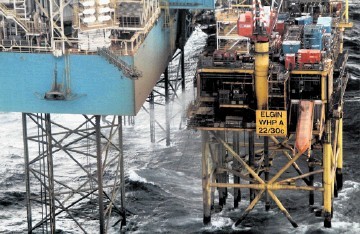
An elite team of offshore crisis engineers is preparing to board Total’s abandoned Elgin platform to halt a dangerous gas leak.
A two-mile exclusion and three-mile no-fly zone were set up around the North Sea installation a week ago amid fears that methane spewing out of the damaged well could ignite.
The company is now preparing plans to let specialists from Wild Well Control- the firm which helped tackle BP’s Gulf of Mexico disaster in 2010 – fly to the scene by helicopter.
Subject to approval from the UK Government’s Health and Safety Executive (HSE), they could be on the Elgin within 48 hours.
Houston-based Wild Well Control specialises in managing disasters such as oil rig explosions, and its firefighters are popularly known as “Hellfighters,” thanks to a Hollywood film of the same name.
They will want to secure the site and assess how best to close off the damaged well at the centre of the leak.
A Total spokesman said last night: “We are putting in place the plans to allow crews – outside specialists from Wild Well Control accompanied by Total personnel – to safely go on to the platform in the next couple of days.
“Safety remains our first priority. We always have an eye on ensuring that any process is safely managed.
“We want to ensure we do this as quickly and as safely as possible.”
About 172 tonnes of gas has been leaking from the Elgin every day since last Sunday, when more than 200 workers were evacuated.
The gas has formed a highly explosive cloud around the platform, and firefighting ships remain on standby.
Total confirmed on Saturday morning that the flare which had continued to burn on the Elgin had finally extinguished itself.
The company had been considering bringing in military helicopters to put it out.
With the biggest ignition threat now extinguished, work to halt the leak can gather pace.
At a press conference on Friday, the company said it would attempt to stem the leak either by dropping heavy mud into the leaking well, which would mean bringing back some men to the platform, or drilling two relief wells.
The operation could take six months and cost more than £2billion.
Officials from the HSE will meet Total today to discuss the firm’s plans.
UK Government Energy Minister Charles Hendry said: “Total confirmed to me (on Saturday) that the flare on the Elgin platform has naturally extinguished itself. This comes as very welcome news and a considerable relief. Although the platform was designed to use the prevailing wind to keep the flare from the escaping gas, the fact the flare is out removes a major risk from the equation.
“The task now is very clear – every effort must be made to locate and stop the gas leak.
“Following my visit to Total’s emergency control room on Friday, I know they have some of the best expertise in the world on hand to consider their options. The government continues to monitor the situation very closely to ensure this incident can be resolved as quickly and with as little risk to human life and the environment as possible.”